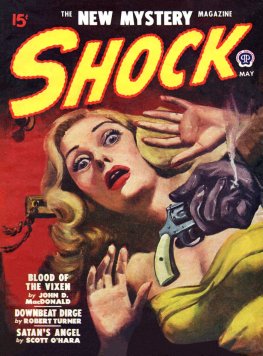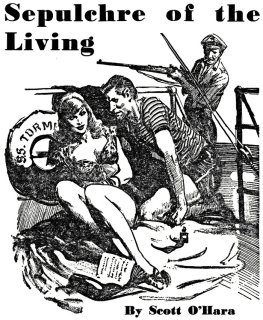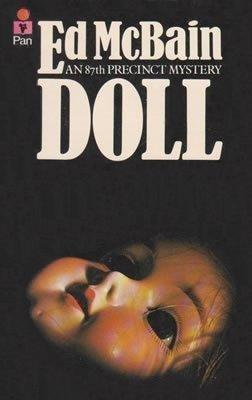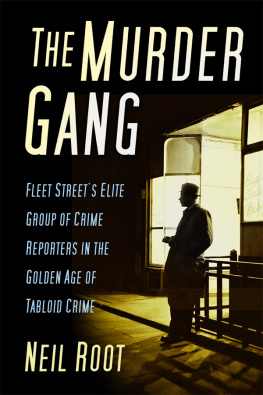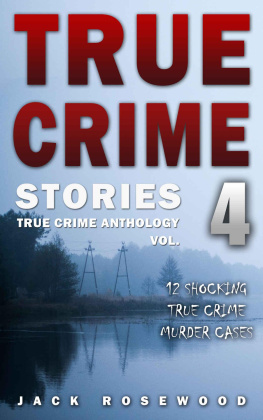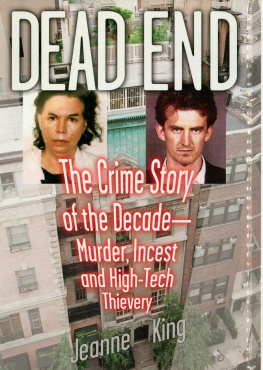Scott O’Hara - Mad About Murder
Here you can read online Scott O’Hara - Mad About Murder full text of the book (entire story) in english for free. Download pdf and epub, get meaning, cover and reviews about this ebook. City: Kokomo, year: 1949, publisher: Popular Publications, genre: Detective and thriller. Description of the work, (preface) as well as reviews are available. Best literature library LitArk.com created for fans of good reading and offers a wide selection of genres:
Romance novel
Science fiction
Adventure
Detective
Science
History
Home and family
Prose
Art
Politics
Computer
Non-fiction
Religion
Business
Children
Humor
Choose a favorite category and find really read worthwhile books. Enjoy immersion in the world of imagination, feel the emotions of the characters or learn something new for yourself, make an fascinating discovery.
- Book:Mad About Murder
- Author:
- Publisher:Popular Publications
- Genre:
- Year:1949
- City:Kokomo
- Rating:5 / 5
- Favourites:Add to favourites
- Your mark:
- 100
- 1
- 2
- 3
- 4
- 5
Mad About Murder: summary, description and annotation
We offer to read an annotation, description, summary or preface (depends on what the author of the book "Mad About Murder" wrote himself). If you haven't found the necessary information about the book — write in the comments, we will try to find it.
Mad About Murder — read online for free the complete book (whole text) full work
Below is the text of the book, divided by pages. System saving the place of the last page read, allows you to conveniently read the book "Mad About Murder" online for free, without having to search again every time where you left off. Put a bookmark, and you can go to the page where you finished reading at any time.
Font size:
Interval:
Bookmark:
Scott OHara
Mad About Murder

As she fell, she had reached out with her left hand and had grabbed the sleasy green mesh curtain. The bathroom was small. She lay on her back, her scuffed feet spread, almost under the sink. Her head was cocked at what he felt was a ridiculous angle, because the wall was in the way and she had doubtless struck it as she fell.
He stood in the doorway, his feet braced as though against the tipping of a world, and it was indeed his world which tipped and threatened to project him out into an unknown darkness.
The small bathroom had a fearsome clarity about it. Six inches from her right hand, the green plastic handle of a trick toothbrush with small tilted head gleamed against the cheap marble finish of the black linoleum. By some odd chance, the toothbrush had fallen parallel to the long line of her robed body and the head was slanted at the same abrupt angle as hers.
Small sounds intruded. The gurgle of the thin stream of water running down the sink drain, the metronome drip of the damp end of the shower curtain, a distant car squealing its way around too sharp a corner, a far-off and misty bellow of a tug in the harbor basin. Night sounds.
The room was hot and misty with the cooling steam of the shower she had taken, and thick with the scent of her, the personal fragrance running like a crimson thread through the headier fabric of perfume and creams and lotions. Mixed with other scents was the indefineable odor of death. Death was written in the blued contortion of face and the slit-tilt of eyes, feral, with dry glitter.
He wondered why he should feel nothing.
He had never thought of her as a big woman, though she had been firm in his arms. But a flaccid thickness of arm poked through the pulled-up sleeves, a greenish pallor of skin tones and the magic was gone.
The magic had been tied to life and vitality. To see her walk away from him had twisted his emotions. He was poorly coordinated, a man who often stumbled and her compact certainty of movement had made him feel as though they were of two different species.
It had started a year before. Each day he had eaten in the same restaurant at noon. And one day, paying his check, he had glanced at her. She was behind the cage, sitting on the tall stool. Their eyes had met. Always she had pushed buttons and his change had clattered down a metal chute. Then she began to take his change, reach through the grill and put the change in his hand.
There had been a satisfaction in the mild perfection of his life, Ellen, the suburban house, the clean, sweet, small-animal smell of the children. But a dark girl with a wide mouth and mockery in her eyes bad turned his home life to dusty unreality, to empty routine.
When courage was high he had asked to see her after work. Later, it had been adviseable to phone Ellen, to explain why it was necessary to stay late in town. Ellen had proved unexpectedly understanding about the extra work that the office was demanding without the offer of extra pay.
The times of staying in the city grew more frequent. Ellen and the office faded back into the same dusty limbo of unreality, while the dark girl became the only reality. The facts about her were simple. Her name was Bertha Lewis. She came from Scranton. Her voice was low-pitched and slightly hoarse, her conversation limited to banalities and clinches. Objectively, he knew that she was rather stupid. Yet he could not account for the aura around her, the heady sense of mystery, the eyes that mocked while she spoke of inconsequential things.
He knew that she found him mildly amusing and that he was of no particular consequence to her. His attempts to analyze her and himself and their feeling for each other only made her restless and irritable. Than she would say: Give the big words a rest, Jack.
Then there was a date and she did not appear. He waited for four hours in the dark doorway. The next noon he found a chance to go near her when no one was about and she said in a husky whisper:
I decided you bore me, Jack, because you talk too much so we break it off right here.
Jack Forrester went meekly home. He tried to cure himself of her as though she had been a form of illness. But she was in the back of his mind with such clarity, such a remembrance of every move and gesture that it was like a melody which refuses to leave the mind. A symphonic sweep of music that he heard at all hours of the day and in the silent moments of the night while Ellen slept. He had to be with her again to speak to her, to see if merely by being with her he could make an end to his memory of her.
In the darkness he had waited. A man he did not know had at last left her, a stout man who had braced himself on the sidewalk where the streetlight made his shadow long, a man who had lit a cigarette with an authoritative snap of a silver lighter and who had walked down toward the taxi stand on the corner, his heels smacking against the sidewalk with firm confidence, the end of the cigarette making pink arcs as he swung a heavy arm.
He had gone up, then. A thread of light had showed under her door and he had heard the muted roar of her shower. When it had ceased, hed tapped and called to her. She had come close to the door and had said: Forget something, Ed?
Bertha, it isnt Ed.
Disgust Weariness. Oh! You.
I want to talk to you.
Go away. Theres nothing to talk about.
Please, Bertha. Voice low because of those nearby who slept. Voice low because there was shame in pleading.
Go away or I phone a cop.
He had been silent then, had heard her go back to the bathroom. He had heard the tiny domestic sound as she begun to brush her teeth, the small rasp altering in pitch as she had cupped her mouth around the brush in various positions.
Fury had been acid in his throat. He had thrust himself at the door, barely conscious of the rasp as the lock tore out of the wood, as the knob swung around and thudded against the plaster
The music of her had been a high symphonic chorus, but now she was dead and the music had turned to a sordid rhythm beat of an off-key piano playing an unimaginative blues, and then had faded away until there was no music at all.
Suddenly, there was a faint sound from her and he felt sweat on his body. Then he realized that some compression of gases within her had forced a passage through her closed throat.
The sound of the running water annoyed him. He reached over to turn it off, pausing as his fingers reached the faucet, drawing his hand back suddenly. She had wiped the mist from the mirror with one swipe of a towel, and the space she had cleared was partially misted over.
He turned and went into the other room, sitting for a long time on the bed with his face in his hands. When he looked up he could see her right arm and hand, her dark hair and the blue-white of her temple. The sound of the running water was a distant whisper.
Then he moved slowly and with great weariness. It was difficult to force his mind back onto a logical basis. The investigation would be alarmingly simple: Yeah, there was a thin fella who hung around. Eats here every noon, or used to. Works upstairs somewhere in the building. Sure, I heard em spatting a while back, then he stopped eating here. Sure, I could identify him.
You say, Mrs. Forrester that your husband phoned and said hed stay in town. Where?
Forrester, give us an account of your movements on the night of the murder.
He inspected the door. The little metal box into which the bolt fitted had been torn free. Using knife blade as a screwdriver, breaking off wooden matches in the torn holes, he replaced the metal part. She had not used the ordinary lock because any skeleton key would fit it.
Font size:
Interval:
Bookmark:
Similar books «Mad About Murder»
Look at similar books to Mad About Murder. We have selected literature similar in name and meaning in the hope of providing readers with more options to find new, interesting, not yet read works.
Discussion, reviews of the book Mad About Murder and just readers' own opinions. Leave your comments, write what you think about the work, its meaning or the main characters. Specify what exactly you liked and what you didn't like, and why you think so.


![Scott O’Hara - Five-Star Fugitive [= Border Town Girl]](/uploads/posts/book/907914/thumbs/scott-o-hara-five-star-fugitive-border-town.jpg)
